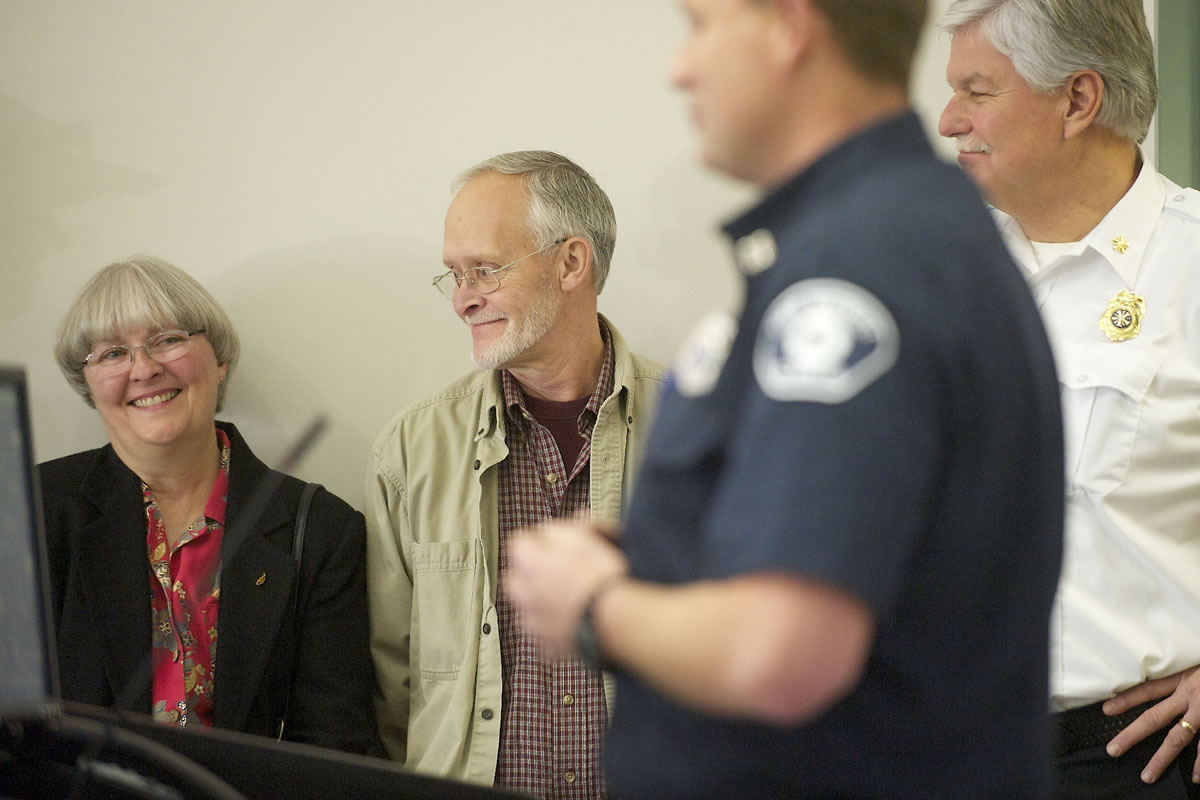Approximately 360 to 370 people go into cardiac arrest annually in Clark County, and an average of 17 percent survive, Dr. Lynn Wittwer said Friday.
Wittwer, the county’s emergency medical services program director, said he was defining “survive” as patients who leave the hospital in good neurological condition.
While a 17 percent survival rate ranks higher than many places in the United States, Wittwer would like to increase the survival rate to 30 percent.
And a tool he believes will help was unveiled Friday at the Clark County Public Service Center: PulsePoint, a free smartphone app that alerts CPR-trained users to a cardiac arrest in public.
The Vancouver Fire Department has been working about two years to get the app activated here, ever since Chief Joe Molina heard about it in California. A $25,000 grant paid for the behind-the-scenes work that Clark Regional Emergency Services Agency had to do in order for the app to work countywide. When a call about a cardiac arrest goes to 911, users of PulsePoint who are within 400 yards of the call will be alerted.
Chief Nick Swinhart of the Camas-Washougal Fire Department demonstrated the app Friday.
Now that Vancouver police and sheriff’s patrol cars are equipped with automated external defibrillators, the PulsePoint app has the next greatest potential to increase survival rates for cardiac arrest victims, Swinhart said. Emergency responders are hoping residents who know CPR will download the app, greatly increasing the chance that if someone suffers cardiac arrest in public there will be someone able to respond within a few minutes.
After downloading the app, the user clicks “Clark County” from a list of agencies. Then, under settings, her or she selects “CPR” from call types.
The user can listen to emergency radio traffic if alerted to a nearby cardiac arrest call. A map will show the patient’s exact location.
Doug Smith-Lee, EMS manager for CRESA, reiterated the app only alerts people to calls made from nearby public locations.
“You’re not going to have strangers running into your house,” he said.
Herschel Yarnell, who has taught CPR to hundreds of people in his role as a volunteer with Clark County Fire District 3, attended Friday’s PulsePoint unveiling as a survivor of cardiac arrest. On March 2, he and his wife, Candace, had gone to bed and were talking when he abruptly stopped speaking. Candace, who knows CPR, called 911 and said her husband wasn’t breathing.
A dispatcher told her to get her husband on his back on the floor, where she was able to start chest compressions.
In six to seven minutes, Fire District 3 Capt. Jason Mansfield arrived with firefighters Joe Gray and Rafe Parsons. They were followed by Battalion Chief Dave O’Brien.
Mansfield said they started advanced cardiac care. Yarnell had a pulse but wasn’t able to breathe on his own. He was transported by American Medical Response to PeaceHealth Southwest Medical Center.
“It’s great to see you here today,” Mansfield told Yarnell, who turned 65 this month and said he has been feeling well.
The first 10 minutes are crucial for a cardiac arrest victim, Wittwer said, and compression-only CPR can be learned in about that much time.
“It’s easy, it’s almost fun,” Wittwer said. “And it can save a life. We can all be heroes at one point or another.”




